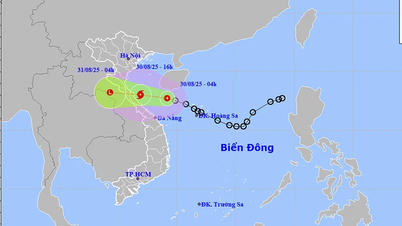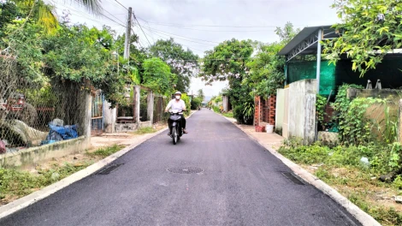On the morning of June 26, in Hanoi, the National Wage Council (NWC) held its first meeting chaired by Deputy Minister of Home Affairs Nguyen Manh Khuong, Chairman of the Council, to discuss and negotiate a plan to increase regional minimum wages (MW) in 2026.
Workers' lives are still difficult
According to a survey by the Vietnam General Confederation of Labor in March and April 2025 with nearly 3,000 workers in 10 provinces and cities, 54.9% of respondents said their salary and income were just enough for their family's basic expenses; 26.3% had to be frugal and spend frugally; 7.9% did not have enough to live on and had to do other jobs to earn more income to cover their living expenses.
Income is not enough to meet family spending needs, leading to workers having to "tighten their belts" and save to ensure their lives. In many cases, they have to borrow money to pay for unexpected needs.
The survey results also show that 12.5% of employees have to borrow money every month to stabilize their lives; 29.9% occasionally (3-4 months/time) have to borrow money; only 55.5% have enough conditions to use meat and fish in all main meals.
"Thus, a significant number of workers do not have stable and adequate nutrition, which affects their physical health, work efficiency and productivity, and also reduces the quality of life for them and their families," commented the Vietnam General Confederation of Labor.
In addition, 72.6% of unmarried people said that salary was the main factor influencing their decision to remain single. Many workers feel that their current income is not enough to ensure a stable life when they start a family, especially in the context of increasing living and child-rearing costs.
In addition, 72.5% of married workers said that their current salary and income influenced their decision to have more children. Living income makes many couples worry about their financial ability to raise children. The cost of raising, educating and caring for children is increasingly expensive, so they have to delay having more children to ensure the quality of life for themselves and their families.
About 53.3% of workers said that their salary only partially meets (over 50%) the need to spend on their children's education. The Trade Union considers this a worrying figure, which could lead to workers' children not having access to quality education, affecting the development and career opportunities of future generations.
In 2024, the country's labor productivity will increase by 5.88% compared to 2023 - exceeding the target assigned by the National Assembly . Vietnam's labor productivity growth strategy aims to reach over 6.5% per year by 2030.
"Given the above situation, early adjustment of regional minimum wage is important, urgent and extremely necessary for workers and their families - Vietnam General Confederation of Labor assessed.
Workers look forward to an early increase in regional minimum wages. Photo: THANH NGA
No consensus on increase yet
At the above meeting, the representative of employers - Vietnam Confederation of Commerce and Industry (VCCI) as well as the representative of employees - Vietnam General Confederation of Labor both proposed the time to apply the minimum wage increase to be from January 1, 2026. However, the proposed increase levels have a large difference.
The Vietnam General Confederation of Labor proposed two options to increase the minimum wage by 8.3% and 9.2% compared to 2024 - 2025. Meanwhile, the representative of VCCI proposed an increase of only 3% - 5%. The Technical Department of the National Wage Council proposed an increase of 6.5% - 7%. This shows that the proposed minimum wage increases proposed by the three parties have a large difference.
According to Mr. Ngo Duy Hieu - Vice President of the Vietnam General Confederation of Labor, Vice President of the National Wage Council - the proposed increase in minimum wage proposed by the labor representative is harmonious, both ensuring the rights of laborers and creating conditions for enterprises to have the opportunity to recover and develop in a context of many challenges.
Mr. Nhac Phan Linh, representative of the Vietnam General Confederation of Labor at the meeting, said that there were many grounds for the labor representative to propose a 9.2% increase (from 320,000 - 450,000 VND/month) and an 8.3% increase (from 290,000 - 410,000 VND/month). According to Mr. Linh, from 2023 to now, electricity bills have increased 4 times, the increase is 17%, while the minimum wage has only increased by 6%, which is very low.
"If the upcoming minimum wage increase is lower than this year's GDP growth - expected at 8%, then the level of benefits that workers receive from the fruits of their labor is not commensurate," Mr. Linh acknowledged.
Meanwhile, Mr. Hoang Quang Phong, Vice President of VCCI, said that the federation agreed to adjust the minimum wage up from January 1, 2026, but the increase was only moderate to increase the room for businesses to adapt to the situation and to reward employees with good performance. "If we increase it further, it will be difficult, because the Vietnam-US trade negotiations will end on July 9, and we don't know what the situation will be like yet," Mr. Phong explained...
After 3 hours of negotiation, the parties still have not agreed on the adjustment level of the minimum wage. Chairman of the National Labor Council Nguyen Manh Khuong suggested that the parties vote but have not found a common voice.
The second negotiation session is expected to take place in early August 2025. According to the practice of many years, each meeting of the National Wage Council takes place in 2-3 sessions. After that, the council will submit to the Government for consideration and decision on the minimum wage increase.
The latest regional minimum wage adjustment was on July 1, 2024, with an increase of 6%. The monthly minimum wage in region I is currently VND4.96 million, region II is VND4.41 million, region III is VND3.86 million, and region IV is VND3.45 million. The hourly minimum wage in region I is VND23,800, region II is VND21,200, region III is VND18,600, and region IV is VND16,600.
According to Mr. Nguyen Viet Cuong - lecturer at Hanoi National University, independent expert of the National Competitiveness Council - to date, the bilateral negotiations between Vietnam and the US have not had any official results. The results of these negotiations will affect the competitiveness and salary payment of enterprises. Therefore, he said that we have to wait for more information until the end of July 2025.
Mr. Cuong said that the minimum wage should be increased from the beginning of 2026, with the increase having to compensate for inflation and ensure the principle of being based on the minimum living standard.
Mr. PHAM VAN TUYEN, Deputy Director of the Department of Home Affairs of Binh Duong province:
Urgent requirement
Increasing regional minimum wage is an urgent practical requirement, aiming to ensure the lives of workers, contributing to creating stability in labor relations, and encouraging workers to stay with the enterprise for a long time.
I think that in the current context, enterprises need stability for production and business. Therefore, it is necessary to balance the interests of enterprises and employees. Because increasing wages also increases the competitiveness of enterprises, especially in the context of labor shortage, recruitment is very difficult. In fact, in Binh Duong, most enterprises always proactively increase wages every year to retain employees.
Ms. CHAU THI NGOC LIEN, Chairwoman of Thai Son SP Company Union (Binh Thanh District, Ho Chi Minh City):
The adjustment level should be proportional.
The inflation has affected the lives of workers, therefore, the Trade Union and the Board of Directors of Thai Son SP Company strongly support the adjustment of the minimum wage. However, we hope that the adjustment will be made periodically every 3 years/2 times or every 2 years, accepting a higher adjustment level than the annual adjustment to both reduce procedures and still ensure increased income for workers.
In addition, to give businesses time to prepare plans for wage increases, the adjustment of the minimum wage should be implemented from January 1, 2026 at a proportionate level, about 10%. In addition to adjusting the regional minimum wage, it is necessary to consider increasing the family deduction because it has remained the same for many years. After employees receive a wage increase, they will have to pay personal income tax, making the wage increase less meaningful.
On the other hand, the application of regional minimum wage is not reasonable when Ho Chi Minh City and Hanoi have a much higher standard of living than other localities in Region I. Workers tend to choose localities with the same salary but lower living costs to work. This makes it increasingly difficult for enterprises in Ho Chi Minh City to recruit workers. Therefore, there should be more policies for workers from other provinces to work in Ho Chi Minh City or consider the minimum wage applied to localities with high living standards.
Ms. TRAN NGOC LAN - worker at a garment company in Binh Tan district, Ho Chi Minh City:
Hoping for improved wages
Although I have been working for more than 3 years, my basic salary is currently only about 5.5 million VND/month (regional minimum wage is 4.96 million VND/month). With allowances and overtime, my monthly income is 7 - 9 million VND.
My husband is a security guard, our total income is about 16 million VND/month. Meanwhile, we have to pay about 3 million VND (nearly 50% of my basic salary) for rent, electricity, water; send 5 million VND back home to pay for school fees and food for 2 children...
So what I want most is for my salary to improve so that I can set aside some money each month to take care of my children's future.
T.Nguyen - T.Nga recorded
Source NLDO
View original linkSource: https://baotayninh.vn/chua-thong-nhat-muc-tang-luong-toi-thieu-vung-a191863.html





































































































Comment (0)